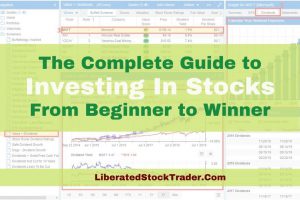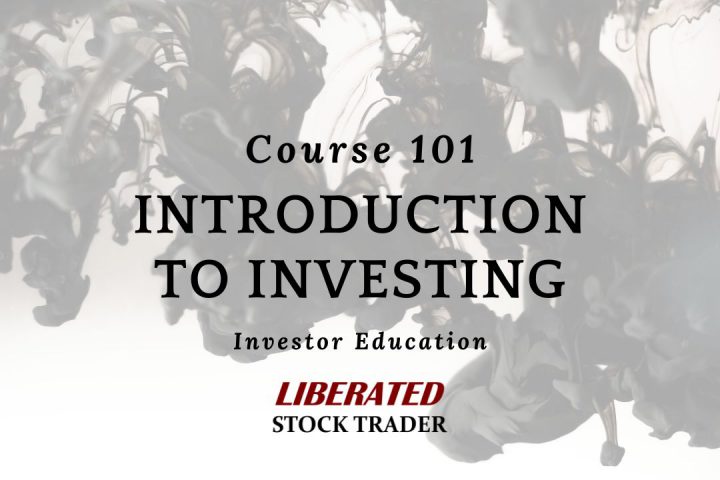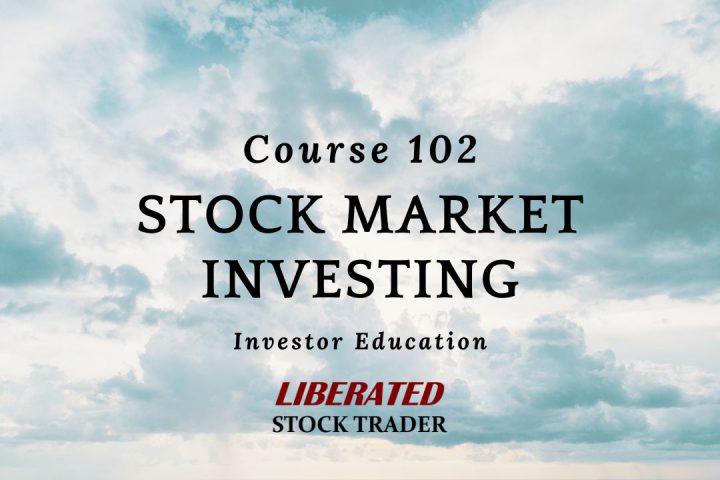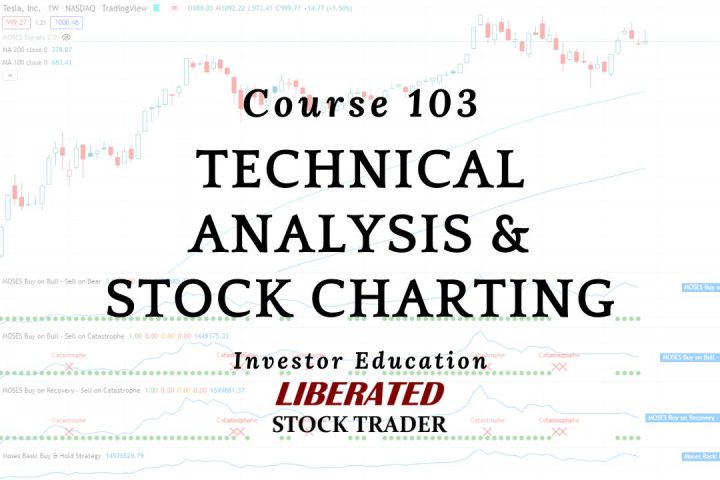Free Stock Trading & Investing Training
Are you looking to invest in the stock market but don’t know where to start?
Liberated Stock Trader offers free stock investing courses covering value, growth, dividend investing, and technical chart analysis. Our courses are developed by IFTA member and certified financial technician Barry D. Moore.
Free Investing In Stocks Course – 180 Lessons
Available Free
Start This Course (No Registration Required)
Our free investing in stocks course covers a high-level overview of technical stock chart analysis, ETFs, funds and value, growth, and dividend investing strategies. This is a great introduction to trading, including the best investment books, movies, videos, and stock market apps.
Introduction to Investing Course 101
Available Free
Start Course 101 Now (No Registration Required)
Our Introduction to Investing course is for anyone who wants to learn about all types of market investing, including ETFs, mutual funds, stock options, real-estate REITs, commodities, futures, bonds, and currencies. You’ll get the big picture of all investment options with pros and cons.
Stock Market Investing Intermediate Course 102
Available Free
Start Course 102 Now (No Registration Required)
Do you want to learn how to invest in the stock market? Wall Street can be a confusing place. That’s why we created this course – to help you build a foundation of knowledge so you can make informed decisions about your money.
Our beginner stock market investment course dives into understanding the world’s stock markets, booms, crashes, market cycles, rating agencies, and how Wall Street analysts operate. This course helps you avoid stock market scams and build your knowledge and confidence.
Stock Charting Technical Analysis Course 103
Available Free
Start Course 103 Now (No Registration Required)
Our free stock technical analysis course provides insights into stock charts and trendlines. We take a look into stock chart patterns and their accuracy. Stock chart indicators like moving averages, MACD, RSI, ROC, and gaps are just some of the valuable lessons you will learn.
With our course, you will understand how to read stock charts. You will be able to identify trading opportunities and know when it is time to enter or exit a trade.
Pro Stock Trading Investment Courses & Strategies
Liberated Stock Trader Professional Training Courses can help you achieve your financial goals.
Liberated Stock Trader can show you how. Our Liberated Stock Trader Pro course is designed to help you learn how to invest and trade stocks like a pro. Plus, we offer email support and a TradingView chat room for questions and assistance, so you can always get help when needed.
With our MOSES strategy, you can beat the market with index ETF investing. And with our Beat the Market strategy, you can outperform the S&P 500 with high-performance stock picking.
Liberated Stock Trader Pro
Our Best Stock Trading & Investing Course
Are you looking to take your stock trading to the next level?
Our professional-grade stock chart technical analysis lessons are perfect if you want to learn how to trade stocks like a pro. Our video lessons are packed with information on charts, indicators, trendlines & patterns, fundamental financial analysis, and more.
You’ll also learn stock screening and financial analysis and get six unique dividend and value investing strategies. Plus, we teach you how to manage your portfolio and protect your investments with risk management tactics.
95 Videos (16 hours) + The “Liberated Stock Trader” eBook + Email Support + TradingView chat room
With over 16 hours of video content, you’ll find everything you need to become a successful investor. So what are you waiting for? Start learning today!
Fast Track Your Skills! Go Pro for $499
Market Outperforming Stocks ETF Strategy
Our Long-term Investing Strategy
Protect your investments and beat the market with MOSES
The MOSES ETF Investing System is designed to help you reduce any losses you incur over the years of your investment. It’s essential for anyone who wants to compound their investments and beat the market. With MOSES, you can rest easy knowing that you will be alerted before the next crash happens so you can take appropriate action. You will also know when the bear market is over so you can start investing again with confidence. The MOSES system has been successfully working for over 24 years.
8 Videos + The “M.O.S.E.S.” eBook + Coded Scripts For TradingView + System Logic + Email Support + TradingView Chat Room
Sign up for a free trial of the MOSES Market outperforming Stock ETF strategy today!
LST Beat the Market Strategy
High-Performance Growth Stock Selection Strategy
Are you looking for a strategy to help you beat the market?
The Liberated Stock Trader Beat the Market Growth Stock Strategy is a proven system that outperforms the S&P500. It identifies 35 financially healthy high-growth stocks with a track record of outperformance. This strategy outperformed the S&P500 in 8 of the last nine years, providing a 9-year total return of 546%. Imagine what you could do with an investing edge like this – beating the market and making more money. It’s time to take your stock-picking game up a notch!
5 Videos + The “Beat the Market” eBook + Scripts & Logic For Stock Rover + Email Support
Why wait? Start selecting great stocks now!
Lifetime Access to All Training
All Training + The Stock Market Crash Detector
Become an All-Star Investor – All Courses -30% Off
With access to our best stock investment courses, you can learn to trade with technical analysis and invest with fundamental analysis. Plus, we have a course that provides a winning ETF investment strategy for long-term wealth building. Finally, our Beat the Market growth stock course helps you find stocks with a high chance of outperforming the S&P 500. With our all-star pass, you’ll have access to all of our courses – plus, you can get started today with a free trial. That means you can learn at your own pace and start making better investing decisions.
108 Videos + 3 Full eBooks + 5 Scripts for TradingView + Code & Logic For Stock Rover
Start now to avoid stock market crashes and build wealth over time.
FAQ
How can I learn about the stock market for free?
To learn about the stock market for free, I recommend watching financial documentaries, listening to audiobooks, and enrolling in our free stock market training courses covering financial and technical chart analysis.
What are the most important topics when learning stock trading?
The most important topics when learning stock trading are risk management, fundamental analysis, technical analysis, and money management. Additionally, it's also helpful to learn about the different types of stocks and how they work together in a portfolio. Knowing different strategies like day trading, swing trading, value investing, or income investing is essential.
Do free stock trading courses cover chart analysis?
Yes, our free stock trading courses cover both financial and technical chart analysis. For example, our training courses teach students how to read candlestick charts, determine key support & resistance levels, and identify price patterns and trends. Additionally, you'll learn about fundamental concepts like earnings reports and key company metrics.
What type of stock analysis is covered in free stock trading courses?
Very few stock trading courses cover both fundamental and technical analysis. However, our training includes fundamental analysis, financial performance, market position, and competitive advantages. Our technical analysis lessons focus on analyzing past price movements to identify potential trends and make predictions about future price action. Topics such as chart patterns, support & resistance levels, and indicators are also covered.
How do students learn to read and interpret charts in free stock trading courses?
Our courses provide comprehensive instruction on reading and interpreting stock charts. Students become familiar with the different charts offered, such as line, bar, and candlestick charts. We then show you how to read these charts to determine buy/sell signals and identify trends in stock prices.
What type of strategies are taught in free stock trading courses?
In our free stock trading courses, students can expect to learn strategies such as technical analysis, price action trading, and momentum investing. Each strategy provides its unique approach to analyzing the market and deciding when to buy or sell stocks.
Are there any topics related to money management included in these courses?
Our premium course Liberated Stock Trader Pro, covers money management, trading sizes, and portfolio management techniques. We also teach risk management techniques that help traders protect their capital in volatile markets.
Can you practice stock trading techniques with real-time data using a demo account?
Yes, TradingView offers a free account with real-time data, including a paper trading option to practice trading. With TradingView, you do not need to open a demo account with a minimum balance; it's free.
Comments are closed.






Best Course For Beginners, loved the way you helped us to understand
I was trying to find a broker to get some information when i came across your free offer.
I hope I will learn a lot more than I would have asked about. I don’t know a thing about
the stock market. This will be a new experience.
Dear respected sir
Can you provide any Software for Bid and offer price, in live market
Hi Sachin, try this https://www.liberatedstocktrader.com/top-10-best-stock-market-analysis-software-review/
hi barry, i really want to start swing trade or day trade. may i ask, in what way the Pro training course will help me to achieve my goals?
Hi Jinn, thanks for the question. Yes the PRO training will help. All the sections on technical analysis will help you learn chart analysis and supply and demand.
Section Four – Technical Analysis – Doing It Properly – Charts, Patterns & Indicators [Video Modules 11-20]
Section Five – Important Trading Strategies, Sentiment & Psychology For Success [Video Modules 21-23]
Over 12 videos are dedicated to this topic and of course the chapters in the book.
Good luck
Barry
Hi Susan, your 16 hours of PRO Training video is all ready and waiting, simply login
And a big thank you for your kind comments.
Barry
Hello Barry,
I have travelled for two weeks. Internet connection was not good. I just got back home. I have not claimed my PRO
trainning yet. Can you please send it to my e-mail? as I have to travel in the near future again? I am thru with your
book. I am so greatful to you . I have understood most of the Topics. It was simple and direct to the point. Thank you
Barry. Great job.
Best Regards S.Bodora
The Liberated Stock Trader PRO is an exceptional educational tool to learn and hone your skills in the world of stock trading and financial investments. I found the entire program to be exceptionally straightforward to use with good explanations of how the market system works. Every chapter is succinct and very effective in showing both new and experienced investors how to best leverage the stock market and succeed in the diverse and complicated world of stock market trading. Additionally, the market analysis tools are superb and greatly expand your skills to develop and grow a diverse portfolio. Keep up the great work, Barry.
Thanks for the feedback Kirk, I appreciate it.
Hi BarryM, I completed your pro course, 3 months ago and it is so in depth, I feeel like I learnt a lifetime worth of knowledge, I have just made a good profit on 3 stocks. As yo teach I need to beat to market, I am now. thanks so much.
Hi Barry,
I am an Intermediate Trader of several years of mixed experience in Stocks/Bonds/Futures/Crypto/Betting/Poker/2 Flys crawling up a wall…
I really like your thorough but simple, easy to grasp explanations and your level of knowledge is superb… which is why I joined.
I look forward to reading your site, in depth and feel it will be really beneficial to fill in the gaps of my knowledge and increase my skills…in short what I have read really resonated with me!
So thanks and cant wait to get into the knowledge base you are generously making available.
Best Regards.
HI Craig, wow sounds like you have played in every market. I wonder how you play 2 flys crawling up a wall
I hope you enjoy the training.
Barry